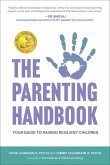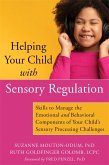Liliana J Lengua, Maria Amy Gartstein
Parenting with Temperament in Mind
Navigating the Challenges and Celebrating Your Child's Strengths
26,99 €
inkl. MwSt.
Versandfertig in über 4 Wochen

13 °P sammeln
Liliana J Lengua, Maria Amy Gartstein
Parenting with Temperament in Mind
Navigating the Challenges and Celebrating Your Child's Strengths
- Broschiertes Buch
- Merkliste
- Auf die Merkliste
- Bewerten Bewerten
- Teilen
- Produkt teilen
- Produkterinnerung
- Produkterinnerung
This book will help parents understand and work more effectively with their child’s temperament.
Andere Kunden interessierten sich auch für
![Imperfect Parenting Imperfect Parenting]() Dona MatthewsImperfect Parenting21,99 €
Dona MatthewsImperfect Parenting21,99 €![The Autism Toilet Training Handbook The Autism Toilet Training Handbook]() Mary WrobelThe Autism Toilet Training Handbook15,99 €
Mary WrobelThe Autism Toilet Training Handbook15,99 €![Good Enough Parenting Good Enough Parenting]() Timothy A CavellGood Enough Parenting21,99 €
Timothy A CavellGood Enough Parenting21,99 €![Nature Meets Nurture Nature Meets Nurture]() Stacey N DoanNature Meets Nurture21,99 €
Stacey N DoanNature Meets Nurture21,99 €![The Parenting Handbook The Parenting Handbook]() Tania JohnsonThe Parenting Handbook18,99 €
Tania JohnsonThe Parenting Handbook18,99 €![Criando A su Nino Con Orgullo Latino Criando A su Nino Con Orgullo Latino]() Carmen Inoa VazquezCriando A su Nino Con Orgullo Latino13,99 €
Carmen Inoa VazquezCriando A su Nino Con Orgullo Latino13,99 €![Helping Your Child with Sensory Regulation Helping Your Child with Sensory Regulation]() Suzanne Mouton-OdumHelping Your Child with Sensory Regulation17,99 €
Suzanne Mouton-OdumHelping Your Child with Sensory Regulation17,99 €-
-
-
This book will help parents understand and work more effectively with their child’s temperament.
Hinweis: Dieser Artikel kann nur an eine deutsche Lieferadresse ausgeliefert werden.
Hinweis: Dieser Artikel kann nur an eine deutsche Lieferadresse ausgeliefert werden.
Produktdetails
- Produktdetails
- Verlag: American Psychological Association (APA)
- Seitenzahl: 286
- Erscheinungstermin: 20. August 2024
- Englisch
- Abmessung: 214mm x 139mm x 14mm
- Gewicht: 362g
- ISBN-13: 9781433838606
- ISBN-10: 1433838605
- Artikelnr.: 68544607
- Herstellerkennzeichnung
- Libri GmbH
- Europaallee 1
- 36244 Bad Hersfeld
- gpsr@libri.de
- Verlag: American Psychological Association (APA)
- Seitenzahl: 286
- Erscheinungstermin: 20. August 2024
- Englisch
- Abmessung: 214mm x 139mm x 14mm
- Gewicht: 362g
- ISBN-13: 9781433838606
- ISBN-10: 1433838605
- Artikelnr.: 68544607
- Herstellerkennzeichnung
- Libri GmbH
- Europaallee 1
- 36244 Bad Hersfeld
- gpsr@libri.de
Liliana J. Lengua, PhD, is Maritz Professor of Psychology at the University of Washington, director of the Center for Child and Family Well-Being, a child clinical psychologist, and mother of three children. She is internationally recognized for her research on children’s vulnerable and resilient responses to stress, and how parenting and children’s temperament contribute to children’s unique responses to stress. She also researches the effects of economic disadvantage and adversity on parenting and children’s development. She has been the principal investigator of several federally funded research projects and is the author of over 150 published papers. Visit ccfwb.uw.edu. Maria (Masha) Gartstein, PhD, is professor of psychology and director of the clinical psychology doctoral program at Washington State University. Dr. Gartstein has published over 100 research articles focused chiefly on temperament, namely how different profiles/types change over time, and how they confer risk or protection with respect to emerging symptoms and disorders. Two major themes throughout this work are the role parenting plays in how temperament develops and the contribution of temperament to later adjustment. She has served as principal investigator for several federally funded research projects. Visit labs.wsu.edu/infant-temperament/ and follow @mashagartstein for more information.
Introduction: Tailoring Your Parenting to Your Children's Temperament
Part I. Understanding Temperament and Parenting
Chapter 1. What Is Temperament?
Chapter 2. Temperament Characteristics and Behaviors
Chapter 3. Brain and Body Systems Underlying Temperament
Chapter 4. Core Parenting Principles
Part II. Parenting With Your Children's Temperament in Mind
Chapter 5. The Fearful or Fearless Child
Chapter 6. The Easily Frustrated Child
Chapter 7. The Impulsive Child
Chapter 8. The Inflexible Child
Part III. The Core Parenting Principles
Chapter 9. Be Present
Chapter 10. Be Warm
Chapter 11. Be Balanced
Chapter 12. Be Consistent
Chapter 13. Being Consistent with Common Challenges
Afterword: Building Social and Emotional Competence, Joy, and Well-Being
References
Appendix A: Child Temperament Assessment
Appendix B: Parenting Self-Reflection
Part I. Understanding Temperament and Parenting
Chapter 1. What Is Temperament?
Chapter 2. Temperament Characteristics and Behaviors
Chapter 3. Brain and Body Systems Underlying Temperament
Chapter 4. Core Parenting Principles
Part II. Parenting With Your Children's Temperament in Mind
Chapter 5. The Fearful or Fearless Child
Chapter 6. The Easily Frustrated Child
Chapter 7. The Impulsive Child
Chapter 8. The Inflexible Child
Part III. The Core Parenting Principles
Chapter 9. Be Present
Chapter 10. Be Warm
Chapter 11. Be Balanced
Chapter 12. Be Consistent
Chapter 13. Being Consistent with Common Challenges
Afterword: Building Social and Emotional Competence, Joy, and Well-Being
References
Appendix A: Child Temperament Assessment
Appendix B: Parenting Self-Reflection
Introduction: Tailoring Your Parenting to Your Children's Temperament
Part I. Understanding Temperament and Parenting
Chapter 1. What Is Temperament?
Chapter 2. Temperament Characteristics and Behaviors
Chapter 3. Brain and Body Systems Underlying Temperament
Chapter 4. Core Parenting Principles
Part II. Parenting With Your Children's Temperament in Mind
Chapter 5. The Fearful or Fearless Child
Chapter 6. The Easily Frustrated Child
Chapter 7. The Impulsive Child
Chapter 8. The Inflexible Child
Part III. The Core Parenting Principles
Chapter 9. Be Present
Chapter 10. Be Warm
Chapter 11. Be Balanced
Chapter 12. Be Consistent
Chapter 13. Being Consistent with Common Challenges
Afterword: Building Social and Emotional Competence, Joy, and Well-Being
References
Appendix A: Child Temperament Assessment
Appendix B: Parenting Self-Reflection
Part I. Understanding Temperament and Parenting
Chapter 1. What Is Temperament?
Chapter 2. Temperament Characteristics and Behaviors
Chapter 3. Brain and Body Systems Underlying Temperament
Chapter 4. Core Parenting Principles
Part II. Parenting With Your Children's Temperament in Mind
Chapter 5. The Fearful or Fearless Child
Chapter 6. The Easily Frustrated Child
Chapter 7. The Impulsive Child
Chapter 8. The Inflexible Child
Part III. The Core Parenting Principles
Chapter 9. Be Present
Chapter 10. Be Warm
Chapter 11. Be Balanced
Chapter 12. Be Consistent
Chapter 13. Being Consistent with Common Challenges
Afterword: Building Social and Emotional Competence, Joy, and Well-Being
References
Appendix A: Child Temperament Assessment
Appendix B: Parenting Self-Reflection







